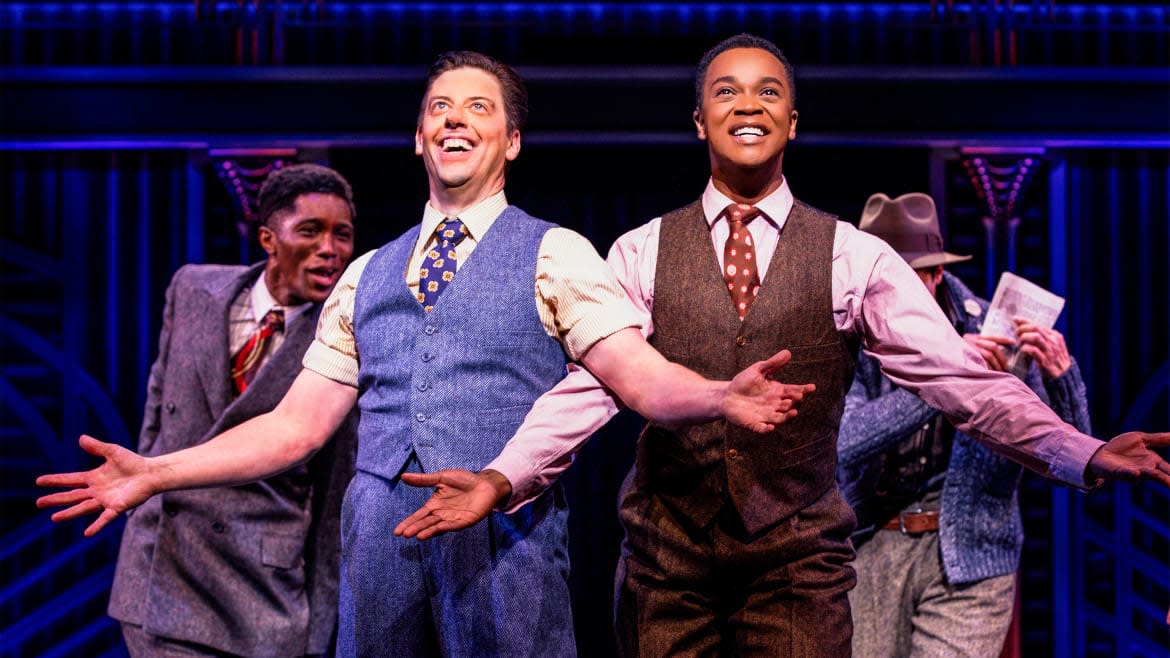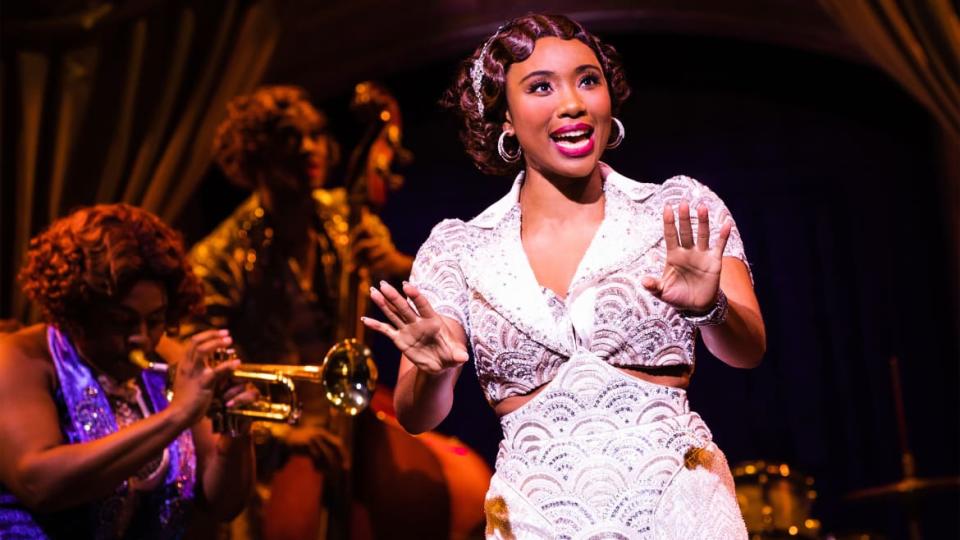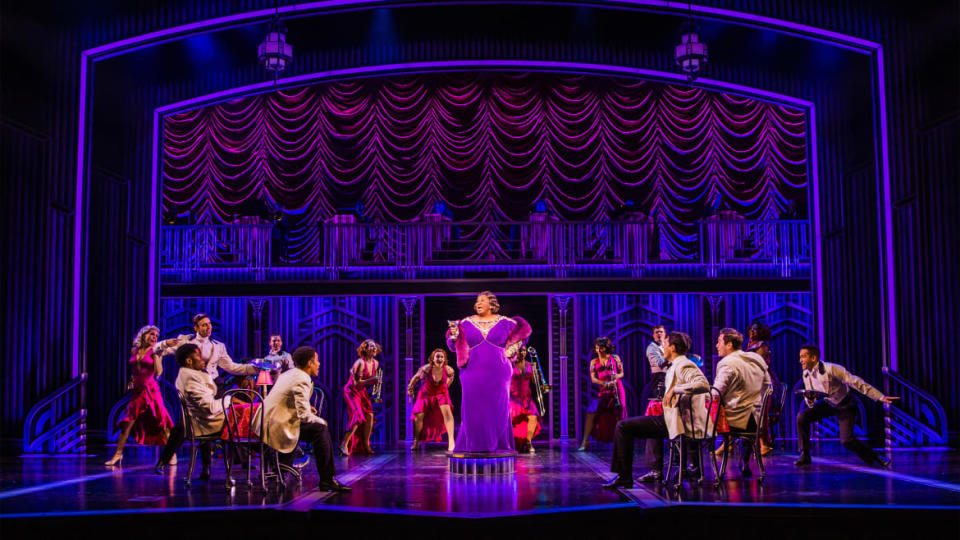‘Some Like It Hot’ on Broadway Goes All Out to Razzle-Dazzle

- Oops!Something went wrong.Please try again later.
- Oops!Something went wrong.Please try again later.
Some Like It Hot (Sam S. Shubert Theatre, booking to Sept 3, 2023) is a razzle-dazzle puzzle—a proudly old-school Broadway musical based on the much-beloved 1959 film that also aims to take account of the times it is now showing in. The dancing and singing are a delight; Some Like It Hot reminds you that in shows both exquisite and terrible—and everything in between—brilliant Broadway dancers and musicians are the unsung backbones of so many productions. They deserve a special round of applause for their work in this show.
Here, the Jazz Age sound and stage-filling movement are on a grand scale; Casey Nicholaw both directs and spectacularly choreographs the show. And yet, despite the bravura set pieces Some Like It Hot serves up—and, to be clear, they are among the most wow on Broadway right now—something is missing in the story amid the colorful chaos, some kind of heart or through-line to link its glittering thrills together. The wrapping of the show sparkles—including costumes by Gregg Barnes, design by Scott Pask, lighting by Natasha Katz, and orchestrations by Charlie Rosen and Bryan Carter—while its narrative feels more unsurely focused.
‘KPOP’ on Broadway Is a Flashy Concert in Search of a Fuller Story
The most significant knot the show confronts is its presentation of drag and gender identity, and the part-joke, part-personal odyssey that unfolds when Joe (Christian Borle) and Jerry (J. Harrison Ghee), in a desperate attempt to escape the Mob—having witnessed a bloody hit in Depression-era Chicago—take on the identities of Josephine and Daphne, two female musicians in an all-woman band. As they run from Spats (Mark Lotito) and his henchmen, everything becomes much more complicated when Joe falls for singer Sugar Kane (Adrianna Hicks), and millionaire Osgood (Kevin Del Aguila) falls for Daphne.
Finding a new angle to the drag storyline through Jerry/Daphne, and the emotions at stake within them, feels right; this is a time when drag queens are being targeted in the latest anti-trans, anti-LGBTQ “groomer” moral panic being cynically and violently whipped up by right-wing politicians and media foghorns. Also, time has moved on since 1959. There is nothing especially transgressive or funny in and of itself about men wearing women’s clothes now—the identities of both the wearer and what is being worn have become more expansively understood beyond traditional binaries over the last 60 years. Drag as performance has long been mainstream.
Book writers Matthew López—who won the Tony Award for Best Play for The Inheritance—and Amber Ruffin and Marc Shaiman (music) and Scott Wittman and Shaiman (lyrics) unpeel Jerry/Daphne’s story to show a character who, through first dressing up in women’s clothes in need, finds something radically, personally liberating in their new identity.
One of the best moments of the show—it deservedly got the loudest and most sustained round of applause at the performance this critic attended—is Ghee’s fiercely sung statement of true self, “You Coulda Knocked Me Over With a Feather,” in which the character makes clear the liberation they have found is not as simple as enjoying wearing women’s clothes, or seeing themselves as a man or a woman. The liberation is about embracing the diverse fullness of who they are or may be—“Daphne is the best part of me. Oh yeah! Daphne is who I love to be.”
“I don’t have the word for what I feel. I just feel more like my self than I have in all my life,” they tell Joe.

Adrianna Hicks in 'Some Like it Hot.'
Alongside Ghee, Del Aguila plays Osgood as knowing not naïve, while also possessing another secret identity that gives his story another edge; in his song “Fly, Mariposa, Fly” (perhaps a reclamation of the once-derogatory Spanish slang for “gay”), Osgood encourages Daphne to “dance and spread your wings.” It is a quiet song, and seems to underline that either Osgood knows all about his romantic conquest, or if he doesn’t, he understands how identities are rarely fixed.
Ghee is excellent, though the wackily comic and tender chemistry and togetherness that crackled between Tony Curtis’ Joe/Josephine and Jack Lemmon’s Jerry/Daphne in the movie is sadly sidelined in this show. It’s there at the beginning in a spiffing number, “You Can’t Have Me (If You Don’t Have Him),” but goes somewhat MIA as the musical continues.
Borle’s Joe/Josephine feels lost, or maybe just not as precisely captured as Ghee’s Jerry/Daphne. He remains the grubbier schmuck of the duo, and instead of he and Ghee playing off one another, Joe and band leader Sweet Sue (the splendid NaTasha Yvette Williams) spar in a funny, performance-spanning joke about how old and frumpy he looks as Josephine, and Sue’s general, absolutely spot-on vibe that Joe/Josephine is a vexatious fly in everyone else’s ointment.
Williams also provides theater-filling musical power in numbers like the opening “What Are You Thirsty For?” and, in certain moments, highlights the racism of the time. Angie Schworer as Minnie, a character written into the show as a daffy assistant for Sue, wittily scoops laughs out of every line she has.
Sugar is oddly underwritten. This isn’t to compare Hicks’ performance to Marilyn Monroe’s, but rather question the rendering of her character. From the outset, Sugar knows everything, she wisecracks and whipcracks, she is nobody’s fool. One of her songs, “At the Old Majestic Nickel Matinee,” movingly lays out her desire to be a Hollywood star as rooted in her experience of being Black growing up in Georgia, but this narrative strand is left in lyrics and not developed. (The musical numbers in Some Like it Hot seem to unpack the characters more confidently than the book.)
Just as in & Juliet, it feels like there is no journey for the central female character to take because she’s basically fine from the outset. Hicks is excellent, resoundingly providing the 11 o’clock belter “Ride Out the Storm,” but you really cheer in the rare moments when her character is allowed to veer from its rather straight-and-narrow tracks. Monroe has such a vivid and varied canvas to play on in the movie, Hicks deserves the same. Her biggest laugh occurs near the end, with a perfectly delivered revelation around her identity, echoing the central theme of the show.
This critic recently rewatched Billy Wilder’s 1959 movie. It is striking how radical—as well as funny and intelligently performed—the film is, right up to and including its famous last line. Even its easy laughs don’t feel exploitative. So, how does the musical approach the movie’s well-known climax, and one of the best lines in movie history—Osgood’s (Joe E. Brown) blithe, unbothered “Well, nobody’s perfect,” when Daphne finally rips her wig off and reveals she is a man?

NaTasha Yvette Williams, and cast, in 'Some Like it Hot.'
Naturally, it avoids it. It has to. The revelation here is not that Jerry/Daphne is a man, but that they are a very personal, non-labeled amalgam. In the musical, Jerry/Daphne gets to the point of saying, “You don’t understand—” only to be interrupted by Osgood: “Daphne, my dear, I do understand. And I think you’re perfect.”
Then 2022 musical Daphne co-opts 1959 movie Osgood’s line: “Nobody’s perfect.”
“Well, that may be true,” Osgood sings. “But Daphne’s perfect for me, Osgood’s perfect for you.” The musical spells out clearly, rather than leaving to fade-to-black screen ambiguity, that this is a relationship that will work on its own shared acceptance of a person rather than any revelation of anything.
Similarly, when Joe asks Jerry/Daphne what to call her, the reply comes that the most important thing is that it is said with love and respect. This too got a deserved round of applause. This critic was both happy to see the visibly careful crafting around Jerry/Daphne, yet wished there was more of their story in the show, and more of the spirit of witty radicalism embedded in the original film, especially its ending.
Still, whatever puzzles there are in story and character in the Broadway show are swept along by the wonderful dancing and music that keeps the show rattling along. Just when you feel the show is flagging, it pulls out a winner—either musically, visually, or a gag.
The best example of this is in the finale, as the Mob goons descend to finally find and kill Joe/Josephine and Jerry/Daphne. Nicholaw has the entire company running, dancing, and prancing in a crazy blur in and out of doors, then on and off stage, concealing, revealing, popping in and popping out—a frenzied chase that goes on, bravely, a pretty long time and becomes all the more delicious for it. Instead of punches, Sugar and the female band dole out cries of “Zeep bap zeh bootlee atta” to ward off the baddies.
At the end, one can only echo Spats as he’s dragged off to face justice. “You’re all wonderful dancers!” he shouts. Our audience as one loudly cheered and applauded in agreement.
Get the Daily Beast's biggest scoops and scandals delivered right to your inbox. Sign up now.
Stay informed and gain unlimited access to the Daily Beast's unmatched reporting. Subscribe now.

